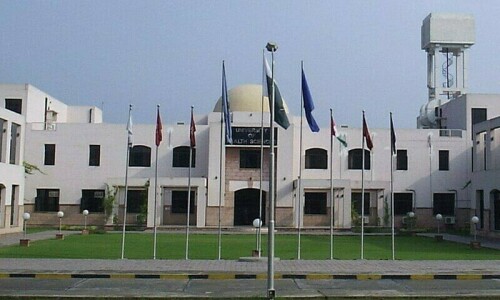LAHORE: Punjab Assembly Standing Committee on Education chairman Engr Qamarul Islam Raja has said the legislation for the implementation of Article 25-A of the 18th Amendment is a tricky matter.
He said there was a lot to do even for the preparation of a draft law and it would be an uphill task to implement the Article 25-A that grants free and compulsory education to all 5-16 years of age children as a basic human right.
Mr Raja was speaking at the Punjab Primary School Library Policy dialogue organised by the Alif Laila Book Bus Society (ALBBS) in collaboration with the USAID at a local hotel on Wednesday.
He said India had inserted this clause in its constitution way back in 2002 but implemented in 2012.
The chairman said he would ensure that component of libraries in schools should be included in the law as well as in the school education department’s annual budget for the fiscal 2014-15.
He said it was highly imperative to revive the culture of reading books, adding that head teachers should encourage students to read books in libraries.
He said the books provided under the Middle Schooling Project should be used in true sense.
Mr Raja admitted that the Punjab government would not be able to meet the Millennium Development Goals by 2015 because the literacy rate could not be enhanced despite various interventions.
Punjab school education department’s deputy secretary (planning) Qaiser Rasheed said the Punjab government had provided 11 million books worth 2m Euros in public schools.
He said that resources were available and it was the responsibility of head teachers and teachers to promote the culture of reading books in schools.
The chairman said the department was also proposing that the government should make a block allocation for the setting up of libraries and provision of books in all public sector schools in the province.
Earlier, ALBBS Vice-President Rabia Khan said books and libraries played an important role in educating young people and groom them to hold the reins of country’s governance in future.
She said there were more students in schools than any time in history and now schooling was not the same as education as large percentage of students would not be reading at their respective grade levels.
According to the survey report of the Annual Status of Education Report 2013, she said 50 per cent students in Pakistan could not read a class-II story text.
Though the children in Punjab performed better, she regretted that still 34 per cent children in class-V could not read a class-II level story text.
Ms Khan said that substantial researches showed that school libraries had a great importance for students’ development and libraries equipped with trained librarians had even greater positive impact on students’ achievements.
She called for developing a five-year Primary School Library Policy including an action-plan for fund raising.
She said the government should define minimum norms and standards in terms of library management committees, staffing and balanced collection of resources.
She also stressed the need for emphasising on the key role and functions of teacher-librarian in the establishment and successful implementation of an integrated library programme.
Ms Khan briefed the audience about the setting up of library corners in 50 schools in Multan and 25 schools each in Muzaffargarh and Kot Addu tehsils besides offering reading opportunity to schoolchildren of other 40 schools in Multan and Muzaffargarh tehsils through its mobile library – set up in a colourful bus.
She said the libraries were now fostering reading culture and creating love of reading among children enrolled in primary schools.
Two primary schools’ head teachers from Multan said the selection of story books for library corners were wonderful as students were attracted in large number that also helped them increase enrolment in their schools.
A USAID representative also briefed the audience about the Pakistan Reading Project, wherein 300 community libraries had been established in Pakistan, including 96, in Punjab.












































Dear visitor, the comments section is undergoing an overhaul and will return soon.